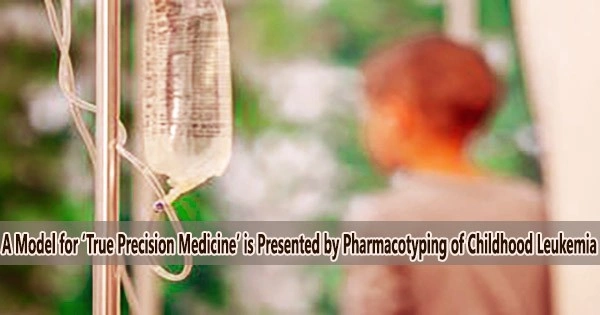The acute lymphoblastic leukemia (ALL) has several genetic subtypes, and researchers at St. Jude Children’s Research Hospital have conducted the largest study to date showing how these subtypes differ in how different drugs react to them.
The findings provide a blueprint for precision medicine to further individualize therapy. The study was published today in Nature Medicine.
ALL, a cancer of lymphocytes (a type of white blood cells), is the most common childhood cancer. Within weeks of beginning treatment, 98% of children with ALL enter remission, and 90% of those kids will eventually be cured.
Modern ALL therapy is risk-adapted, which means that chemotherapy is customized according on clinical characteristics, genetics of the leukemia, and the amount of minimal residual disease (MRD), which is the presence of microscopic cancer cell levels that persist after first therapy.
Pharmacogenomics is the study of how genetic attributes affect drug response. By investigating how the cancer cells react to various therapies in the context of their cancer genomics, St. Jude researchers have now thoroughly examined the pharmacogenomics of ALL. Results from more than 800 patients showed significant variation in ALL as well as different subtype-specific patterns of treatment susceptibility.
“Compared to traditional cancer genomics research, our pharmacogenomics work starts with defining the drug response phenotype of each patient, after which we look into genomics to search for the biological basis for the inter-patient variability in leukemia drug sensitivity,” said corresponding author Jun J. Yang, Ph.D., St. Jude Department of Pharmacy and Pharmaceutical Sciences. “This approach sheds light on the therapeutic implications of specific genomic alterations, which may help clinicians alter care through a better understanding of how and why patients respond to treatment.”
This work is a big step in the right direction to individualize ALL therapy to spare children the side effects of drugs that will not work against their cancer, as well as to steer them to the novel therapies against which their cancer will likely respond. It is functional precision medicine, it’s not just about the genetics and the targets but also about using the right drugs for the right patients.
Jun J. Yang
“This work has yielded a wealth of new insights into the effectiveness of different medications used to treat childhood leukemia,” said William Evans, PharmD, an emeritus faculty member and former St. Jude president and CEO, who co-led the study with Yang. “This work is the product of decades of collaborative research at St. Jude and across the pediatric cancer community. St. Jude may be the only place that can deploy technologies to generate discoveries at this scale across such a large number of children with cancer.”
The researchers found that ALL subtypes with the most favorable prognosis are closely tied to sensitivity to the chemotherapeutic drugs asparaginase and glucocorticoids. Unexpectedly, some subgroups have comparable genomes but differing pharmacological sensitivity patterns.
The study also discovered that, even after taking into account recognized risk factors, individuals could be categorized into various groups based on their medication sensitivity profiles, which were related to prognosis. This highlights the importance of understanding these groups, ALL pharmacotypes, for survival outcomes.
ALL from a functional perspective
The researchers studied children with newly-diagnosed ALL, spanning different St. Jude flagship Total Therapy ALL clinical trials. The trials span more than 20 years, producing a sizable and distinctive cohort of patient data. The susceptibility of leukemia cells to 18 different chemotherapy medications was assessed in individuals who represented 23 different molecular subgroups identified by leukemia genomics.
The findings add a functional understanding to previous studies that identified high-risk or favorable subtypes. For example, ETV6-RUNX1 ALL has a favorable prognosis while BCR-ABL1-like ALL has a poor prognosis. These pharmacogenomics findings provided insight into why individuals with those subtypes had certain types of prognoses.
The identification of biological mechanisms driving drug sensitivity is another potential use of these data that might open the door to the creation of brand-new therapeutics. For example, pharmacogenomics work by the Yang lab previously revealed that LCK activation underlies sensitivity to the drug dasatinib in T-ALL, making it an important target in some leukemias and spurring the development of several ongoing clinical trials to test the concept.
For this study, the researchers analyzed hundreds of thousands of individual data-points. The work thus provides an important resource for the scientific community.
“We hope our data will lead to more discoveries and new targets to drive a new generation of ALL trials in the near future,” said first-author Shawn Lee, M.B.B.S., formerly of St. Jude and now of Khoo Teck Puat-National University Children’s Medical Institute, National University Hospital Singapore.
Results that matter for patients everywhere
“ALL is actually a very heterogenous disease there are a lot of differences between genomic subtypes, such as presenting features and prognosis,” Lee said. “Now, we have shown how drug sensitivity also varies between subtypes.”
The researchers would like to expand the findings with added population diversity. Such global initiatives to gather a more complete picture of pediatric ALL pharmacogenomics would enable future treatments to be biologically informed.
“This work is a big step in the right direction to individualize ALL therapy to spare children the side effects of drugs that will not work against their cancer, as well as to steer them to the novel therapies against which their cancer will likely respond,” Yang said. “It is functional precision medicine, it’s not just about the genetics and the targets but also about using the right drugs for the right patients.”
Authors and funding
The study’s other authors are Gary Rosner, Sidney Kimmel Comprehensive Cancer Center; and Wenjian Yang, Yoshihiro Gocho, August John, Lauren Rowland, Brandon Smart, Hannah Williams, Dylan Maxwell, Jeremy Hunt, Wentao Yang, Kristine Crews, Kathryn Roberts, Sima Jeha, Cheng Cheng, Seth Karol, Mary Relling, Hiroto Inaba, Charles Mullighan and Ching-Hon Pui of St. Jude.
The study was supported by grants from the National Institutes of Health (GM115279, GM141947, CA26487, CA264610, CA021765), a Singapore NMRC Research Training Fellowship and ALSAC, the fundraising and awareness organization of St. Jude.
















